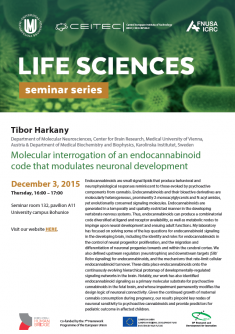Abstract:
Endocannabinoids are small signal lipids that produce behavioral and neurophysiological responses reminiscent to those evoked by psychoactive components from cannabis. Endocannabinoids and their bioactive derivatives are molecularly heterogeneous, prominently 2-monoacylglycerols and N-acyl amides, yet evolutionarily conserved signaling molecules. Endocannabinoids are generated in a temporally and spatially-restricted manner in the developing vertebrate nervous systems. Thus, endocannabinoids can produce a combinatorial code diversified at ligand and receptor availability, as well as metabolic nodes to impinge upon neural development and ensuing adult functions. My laboratory has focused on solving some of the key questions for endocannabinoid signaling in the developing brain, including the identity and roles for endocannabinoids in the control of neural progenitor proliferation, and the migration and differentiation of neuronal progenies towards and within the cerebral cortex. We also defined upstream regulators (neurotrophins) and downstream targets (Slit/ Robo signaling) for endocannabinoids, and the mechanisms that rate-limit cellular endocannabinoid turnover. These data place endocannabinoids onto the continuously evolving hierarchical protomap of developmentally-regulated signaling networks in the brain. Notably, our work has also identified endocannabinoid signaling as a primary molecular substrate for psychoactive cannabinoids in the fetal brain, and whose impairment permanently modifies the design logic of neuronal connectivity. Given the continued growth of maternal cannabis consumption during pregnancy, our results pinpoint key nodes of neuronal sensitivity to psychoactive cannabinoids and provide predictors for pediatric outcome in affected children.








